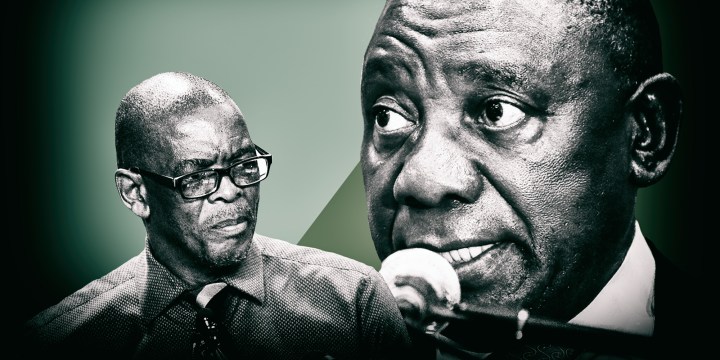ANALYSIS
Noise in a time of realpolitik: Ramaphosa grasps the nettle

President’s delivery of his closing statement at the ANC NEC lekgotla in front of journalists on Monday is almost unprecedented. It appears it was politics behind the move, but there may also be an important lesson about how some people will make much noise even if they don’t actually have the political power to achieve their aims.
It is well known that probably the biggest threat to President Cyril Ramaphosa and his agenda lies within the ANC itself. These elements appear to find expression in the National Executive Committee (NEC), famously the body that voted to remove both Thabo Mbeki and Jacob Zuma from the presidency. As a result of this, NEC meetings have attracted a fair amount of buzz before they begin. The events of the last few days, in which there was much noise ahead of an NEC meeting followed by almost nothing of importance, may be a significant lesson in how important it is to distinguish noise from real politics.
Last week, an impression was created that Ramaphosa was going to have to either fire Pravin Gordhan as Public Enterprises Minister, or move Eskom to the Energy Ministry. This was after the comment by Deputy President David Mabuza that Eskom had “misled” him and Ramaphosa about load shedding. This led to some of Ramaphosa’s supporters mobilising to suggest that any attempt to force the president to do this was actually an attack on Ramaphosa himself.
Such is the power of the NEC that the narrative came close to assuming the proportions of the discussions ahead of NEC meetings towards the end of Zuma’s reign. Back then, it was claimed that Zuma would come under attack at almost every NEC meeting – sometimes this proved to be true and sometimes it didn’t.
In the end, this week, Ramaphosa concluded the NEC lekgotla in a very unusual way. In what might have been a first for an ANC NEC policy lekgotla, his closing address was broadcast live and journalists were allowed into the hall to report on it. This is in stark contrast to normal practice, where the secretary general is the only person to report back on NEC meetings in a press conference after the event.
There is a considerable amount of power in having the last word in a meeting and in giving the first impression of what happened to the general public.
Zuma himself knew this very well. Just after the ANC’s difficult 2016 local elections (in which it lost Nelson Mandela Bay, Tshwane and Johannesburg), it was reported that while the NEC had focused on its dismal performance, he used his closing address to say the ANC had “won” the elections.
It seems Ramaphosa used the same tactic here. But he went further and used one of his greatest strengths in the process.
That Ramaphosa is more popular than his party (the last publicly available poll gives him an approval rating of 62%, the ANC won 58% in the last elections), is one of his most useful tools. By saying in public that the party “should avoid political interference”, in the operational management of state-owned entities, he has made it difficult to now go against that. Anyone who does try, will be going against the NEC’s decision. And if anyone in the NEC wants to speak up against this, they will appear as if they are going against the rest of the body.
He also made sure that the man who appears to be one of his biggest opponents, ANC Secretary General Ace Magashule, was not able to do what he did during a lekgotla last year. Reporting back, as is his official duty, Magashule used the opportunity to claim that the ANC was going to nationalise the Reserve Bank and introduce a policy of what he called “quantity easing” (presumably meant to have been “quantitative easing”). This led to huge dissension in the ANC and put Ramaphosa under pressure.
Magashule is now due to give a full report-back on both the NEC meeting and the lekgotla (these are two different things, the NEC held a meeting on Friday and Saturday, and the lekgotla on Sunday and Monday) on Wednesday, 22 January 2020. While it is possible that he will try to grasp the initiative in some way again, much of his air has been taken by Ramaphosa.
In the meantime, despite all of the fire and fury before the meeting, the only two people who reportedly tried to put Gordhan under pressure in the meeting were Mosebenzi Zwane and Bongani Bongo. There is much evidence that Zwane helped the Guptas while he was the Minister of Mineral Resources. Bongo is currently facing charges of corruption related to his alleged attempt to bribe Parliament’s then legal advisor during its inquiry into Eskom. Both of them are among those facing possible charges when the National Prosecuting Authority acts on the evidence heard at the Zondo Commission.
They also completely lack their own constituencies and appear to be closely tied to Magashule. In other words, they’re political lightweights who are facing possible jail time.
If these are the only people who can be brought to openly attack Ramaphosa and Gordhan in an NEC meeting, then the “fightback faction” may be weaker than previously thought. Or, the true heavyweights are biding their time.
It does seem that those who made all the noise before this NEC meeting will likely do it again. Whether through targeted attacks on Twitter, or strategically placed stories in some media publications, or just well-timed comments, the public story and what is happening behind the scenes in the ANC can be very different. This means it is likely that those who have an interest in weakening Ramaphosa will try again soon, even if it didn’t work this time.
This makes it all the more important to be able to discern the noise from real politics. DM


















 Become an Insider
Become an Insider